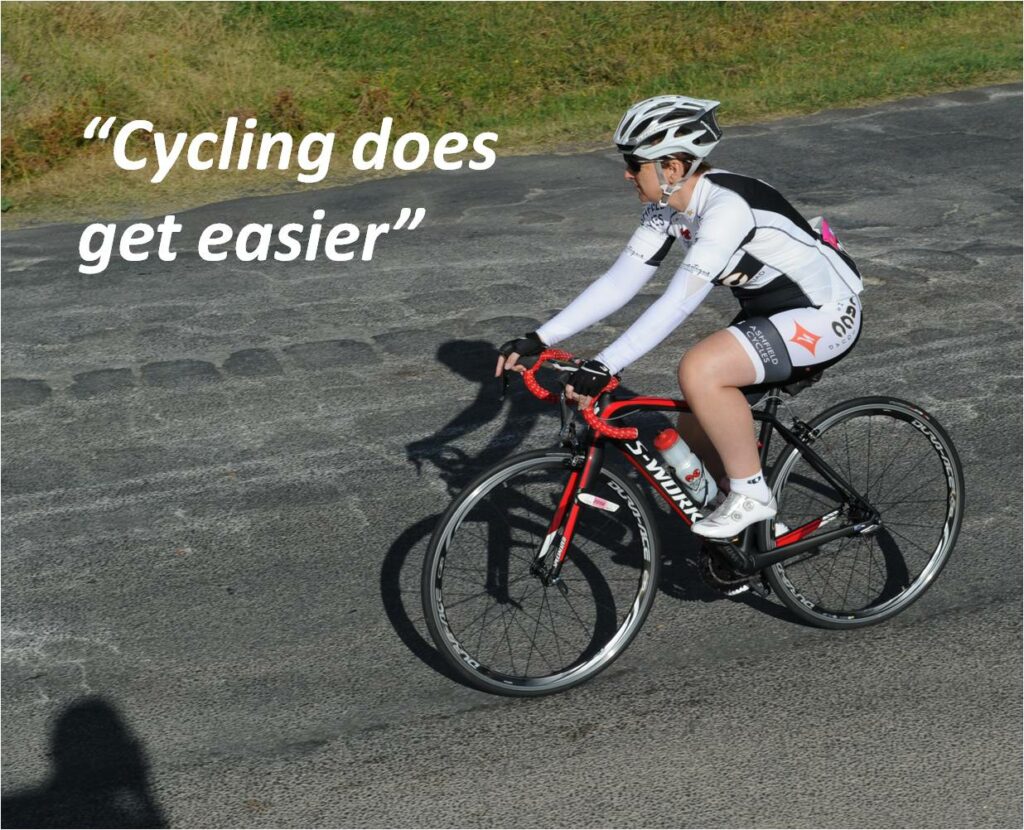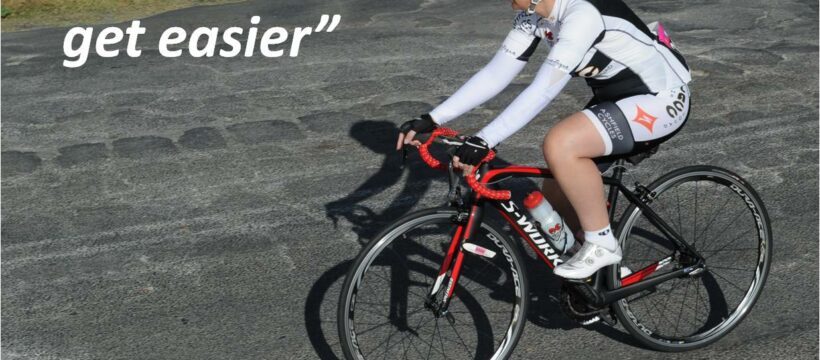Cycling does get easier. Greg Lemond was wrong

US cyclist Greg LeMond famously said, “It never gets easier; you just go faster” but I’d like to challenge that assertion, because in my opinion, over a number of years cycling does get easier. I used to think that this was a phenomenon called muscle memory but I’ve been doing a little research which suggests there’s more to it than just muscle memory.
I recall when I was about two years into road cycling an older gentleman on a club ride said to me that he thought it took three years of riding to really get comfortable and confident on the bike. And when I reached that three-year mark I tended to agree. I initially thought it would take mere months to be a fully confident skilled rider but I was quite wrong.
So what is it that makes cycling easier after more than three years.
Skill development
One of the key things that makes road cycling easier after you’ve been practicing it for a number of years is the development of skills. So over time, you’ll learn the key skills – cornering, hill climbing, descending and learning the mechanical aspects of your equipment. This all takes time. I’m certainly a person who likes to learn things bit by bit. I can’t just absorb all these new skills in one quick lesson.
Improved Muscle Memory
When you start a new exercise routine, you may feel uncoordinated as you complete each new movement. It’s like a child learning to walk – you have no prior experience moving your body that way. But if you keep going, your brain forges new neurological pathways that help muscles repeat movements they’ve performed before. Your body’s ability to remember and repeat movements is called “muscle memory” and this is what occurs when you learn to ride a bike.
Studies show that muscle memory makes it much easier physically to return to your fitness routine after a prolonged break – the templates for muscle strength and coordination are stored within cell nuclei, even after muscle atrophies. So, while it still takes work to get back in shape, you’ll get up to speed sooner than someone who never ridden a road bike.
Stronger heart
Just as your leg and arm muscles get stronger with exercise, your heart muscle also tones up, becoming far more efficient. As you exercise, the tensile strength of the heart develops so it takes fewer heartbeats to pump the same amount of blood through your body. This not only allows you to exercise with less effort, it also increases your longevity since your heart won’t have to work as hard over your lifetime. The best part is, this change happens rapidly once you start a regular exercise routine.
Improved circulation
Capillaries are the smallest blood vessels in the body and deliver oxygen and nutrients to your muscles and organs. When you place demands on your body through cycling, the body responds by increasing blood flow from the heart and creates new pathways for that oxygenated blood to travel. Your capillaries increase in number and in size, which helps oxygenated blood reach areas it may not have reached before.
Over time, that improved circulation reduces fatigue, helps you heal from workouts much quicker, and helps build new lean tissue throughout the body.
Increased circulation also helps you stay healthier by boosting your white blood cell production and helping your lymph nodes, those little organs that flush the metabolic waste out of the body. More capillaries feeding those lymph nodes means more effective waste flushing so you develop a stronger immune system.
More mitochondria
If you stick with your fitness routine, your body responds on a sub-cellular level, too. Deep inside your muscle tissue, mitochondria float in the cytoplasm of individual cells. They’re sometimes referred to as cellular power plants because, within them, a series of chemical reactions occur to break down carbohydrates, fats and proteins into carbon dioxide and water in order to generate energy.
Fit people have more mitochondria than sedentary people do. When you ride your bike, you demand more energy from your body, and it responds by producing more of these little power plants, and as a result, your metabolism increases, so you have more energy and burn more calories, even at rest. Having more mitochondria makes your workouts feel easier, too.
So there you have it. The motto of this tale is that you should ride your bike more often and for more years. Don’t give up after just a short period of time because the real benefits come later.

